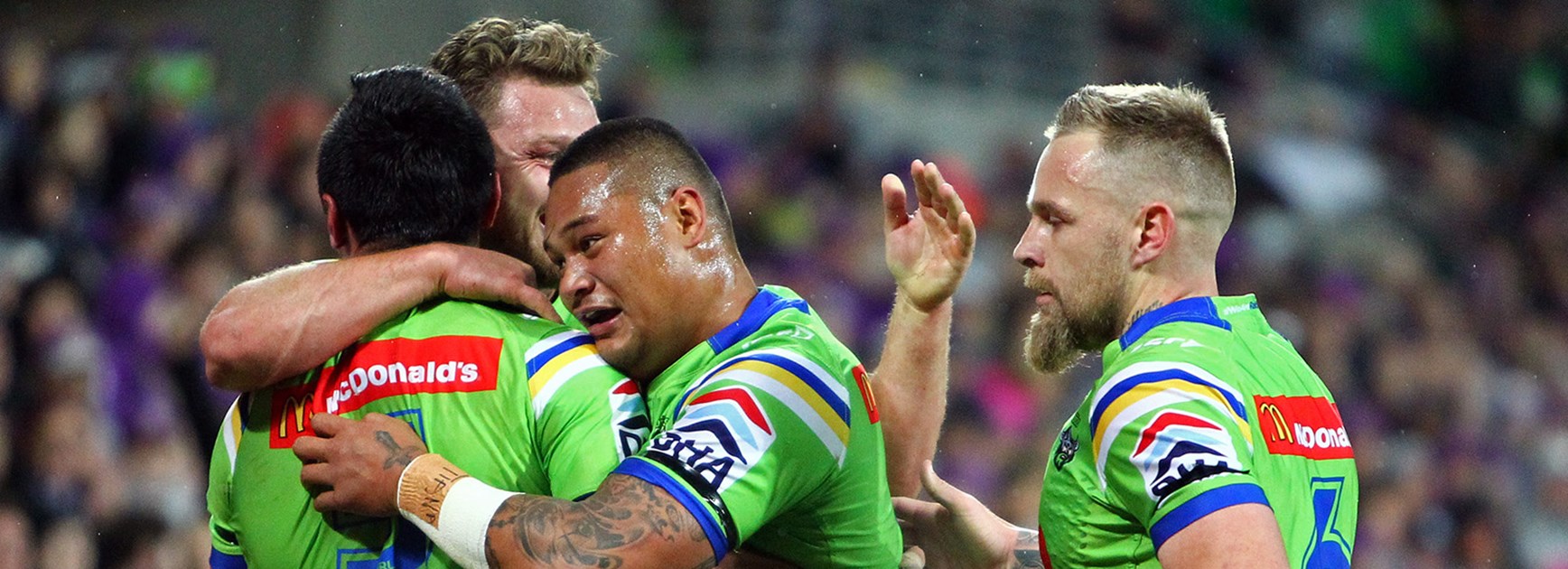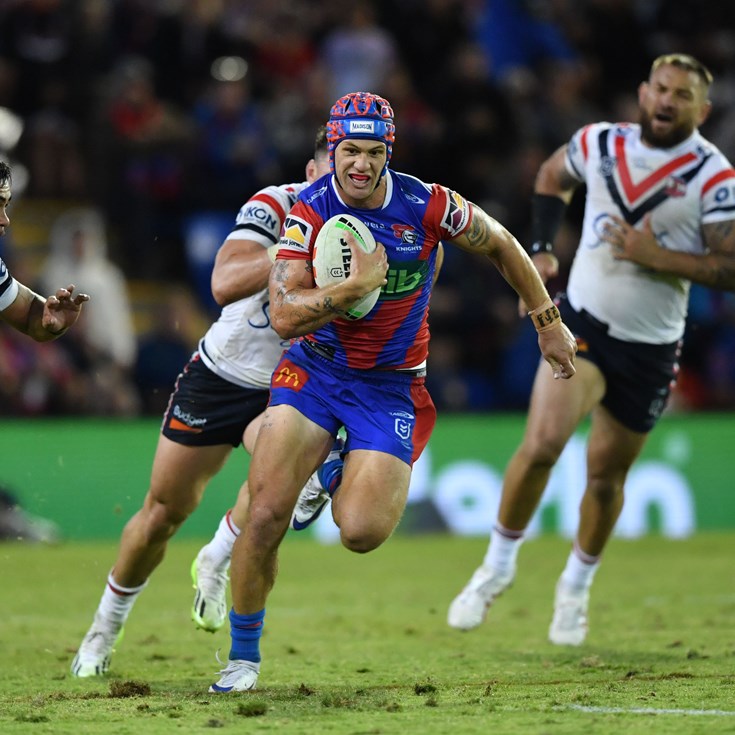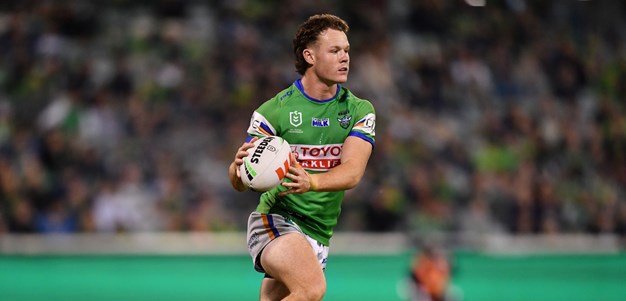
Want to succeed in NRL Fantasy this season? Then you're gonna need a gameplan.
There are two main ways to win in NRL Fantasy Classic – beat your mates in a head-to-head league, or climb the overall points ladder and challenge for the major prize. So it makes sense that there are two strategies you'll need if you want to achieve one of those goals.
There's also a third way – win everything – but I'll get to that later.
(Of course, there are even more ways to win in NRL Fantasy – weekly prizes for top scorer, winning the one-off Thursday Match Day games, winning Origin Fantasy or Test Match Fantasy, winning Finals Fantasy, and winning your Draft Fantasy league. I've covered all those in other articles but this week we're talking about the most popular form of the game – Fantasy Classic.)
Of course, you don't have to 100 per cent settle on one of these strategies right now. You could start with head-to-head as your main focus, then focus on overall points as well if you make a great start to the season. Or you could start out aiming for overall, then struggle early on and switch to head-to-head. Either way, the following tips will be helpful to keep in mind all season.
OK, let's get started.
Strategy 1: Head-to-head
Winning prizes is nice, but the real joy of NRL Fantasy is taking on your mates, family, or colleagues every week in a head-to-head league, then playing off in a finals series on the way to an all-or-nothing grand final. Just like the real NRL Telstra Premiership.
You can spend prizemoney in a day, but bragging rights of being your league champion lasts for a year (at least).
So, what's the best way to get the edge on your head-to-head league rivals? Let's break it down.
a) Picking your starting squad
The key here is finding the cash cows. So, when picking players for a particular position, start from the bottom of the player list. Spot a cheap player who you reckon will get good game time this season? Get him into your team.
Fill out your squad with as many potential cash cows as you can find, and then fill out the rest of your squad with a captain, vice captain, and any other undervalued players. (Check out my regular articles leading into the start of the season for tips on cash cows.)
If you do this right, you could have a fair bit of spare room in your salary cap. That's fine. You're not worried about Round 1 – most head-to-head league's don't kick off until a few weeks into the season, and even if your league starts in Round 1 the randomness of the start of the season means you're a good chance of winning your match-up even if your opponent has spent more money on his or her team. Even if you lose some early head-to-head matches, that's not a problem as long as you can still make the finals.
Your real concern is finding as many cash cows as possible, who you'll use later on to bring in superstars in time for your league's finals series. Your starting squad might be full of rookies and journeymen, but by the second half of the season if things go to plan you're have a starting 17 packed with Origin stars and internationals.
b) Trading strategy
Trade a lot at the start of the season. You have 34 trades for the year, and only 25 players in your squad, so don't skimp on the trading early on. Most of the best cash cows of the year will make themselves known in the opening few rounds, so snap them up while they're still cheap.
In NRL Fantasy, player prices start moving after Round 1 (a good reason to pick the right cash cows in your squad at the start of the season) and prices are based on a player's five most recent scores. That means most player prices will start levelling out after Round 5 or 6. At this stage you should start conserving trades – sure, trade out stars with long-term injuries and trade in any new cash cows who have arrived on the scene, but otherwise don't waste trades on "sideways" moves (one similar player for another).
When the State of Origin period and bye rounds arrive in the middle of the year, again, conserve the trades. The three NRL rounds that come directly before an Origin game are also bye rounds in NRL Fantasy – meaning most head-to-head leagues will take the week off. (League admins can change this if they like when creating a league.) This is when half the NRL teams and all State of Origin players have the weekend off. So if you find yourself with only six players in action on those rounds, don't worry – it won't count in your league anyway.
After the Origin period, start trading again to get your "final" squad together. Your goal is to have 17 stars and a few quality back-up players in your squad by the time your league's finals begin. Keep a few more trades in hand to cover any injuries in the finals, and you are well on your way to being the champ.
Strategy 2: Overall points
Playing to climb the overall points ladder is a bit trickier, but really just involves different priorities. Every week matters, so unlike head-to-head Fantasy coaches you want to score well at the start of the season and over the State of Origin period as well. Here's how.
a) Picking your starting squad
Start by picking a captain and a vice captain, then fill out your squad with value buys. Again, chase as many cash cows as possible, but unlike head-to-head coaches you'll want to spend close to all your starting budget. This restricts your trading power a little in the early rounds of the season (you won't have the cash to upgrade a mid-range player to a gun player) but most of the early trades you'll want will be cash cows, who tend to be cheap anyway.
b) Trading strategy
Like head-to-head coaches, you should trade a lot in the early weeks. No matter how much planning you put into your starting squad of 25, you'll want to make changes when the season gets underway.
The main difference for trading is when the bye period comes around. You'll want to bring in a few players with good bye schedules before Round 12 (check out my Fantasy guide to the bye schedules here) and then use trades throughout the Origin period to give yourself a decent amount of players on each of the major bye weeks. Not necessarily a full 17, but something close to a starting 13. If you do this right, this is where you should find yourself rocketing past the head-to-head coaches on the overall points ladder.
Then, use the bulk of your remaining trades directly after Origin to upgrade those "bye" players for guns – and do it quickly. Unlike head-to-head coaches who will be playing with an eye on their finals, you want to get your "ideal" 17 together as fast as possible to start piling on those monster scores. Keep a handful of spare trades up your sleeve to cover major injuries.
Strategy 3: Head-to-head and overall
This is obviously tricky, but it's not impossible. For example, for the last three years the winner of the NRL.com office head-to-head league has also been the person whose team finished the highest on the overall ladder. (If you're wondering, yes, that person was yours truly.)
To do this you have to borrow a bit from both the above strategies. Concentrate on cash cows early on. Plan for the bye period and use a few trades to keep your scores up over those weeks. But also keep some trades up your sleeve for the run home and the head-to-head finals series.
The key to this strategy is not wasting too many trades. Never trade one player for another player who has a similar price tag and a similar average score, unless you're replacing an injured star. Don't lose patience with cash cows or guns too early. Don't trade out a player because of a one- or two-week injury. Don't get fooled into buying a player because of one good score.
If you can follow these rules (beware, some of those traps are hard to avoid) you should have enough trades to prepare for the bye rounds and the head-to-head finals series.



